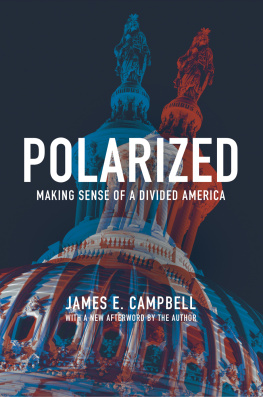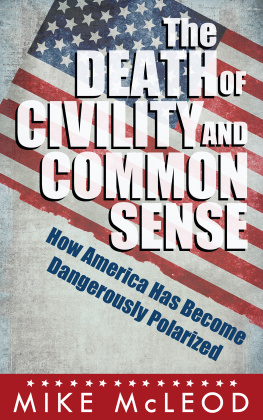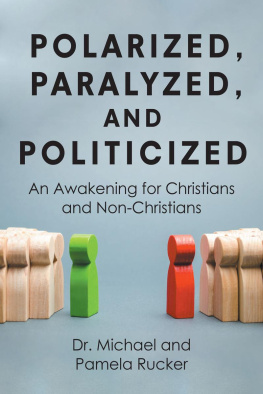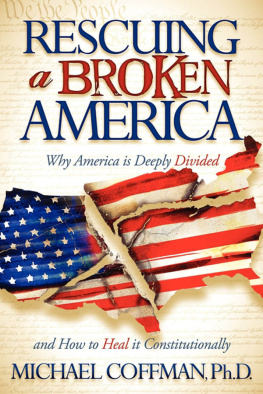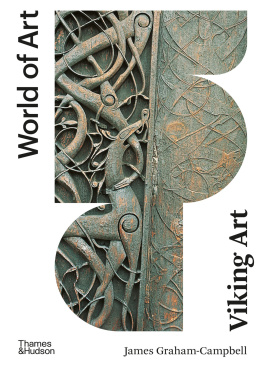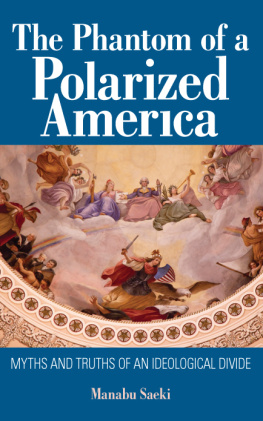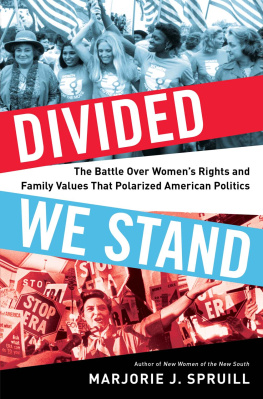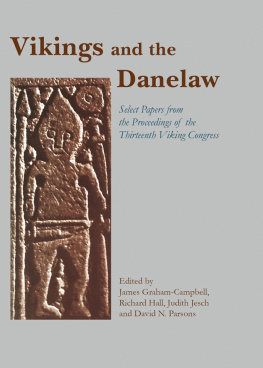Copyright 2016 by Princeton University Press
Afterword to the paperback edition,
copyright 2018 by Princeton University Press
Published by Princeton University Press,
41 William Street, Princeton, New Jersey 08540
In the United Kingdom: Princeton University Press,
6 Oxford Street, Woodstock, Oxfordshire OX20 1TR
press.princeton.edu
Cover art: Dome of the US Capitol Building with Columbia Statue
(photo) / Buyenlarge Archive / UIG / Bridgeman Images.
All Rights Reserved
Second printing and first paperback printing, 2018
Paper ISBN: 978-0-691-18086-1
Library of Congress Cataloging Number: 2015047924
Cloth ISBN 978-0-691-17216-3
British Library Cataloging-in-Publication Data is available
This book has been composed in DIN Pro & Sabon Next LTPro
Printed on acid-free paper.
Printed in the United States of America
3 5 7 9 10 8 6 4 2
ACKNOWLEDGMENTS
This book has been a long time in the works. I began writing more than three years ago, but the book was percolating long before that. I have been reading and thinking about the polarization of American politics since the late 1960s. Polarization was not a commonly used term back then, but we all read a good deal about political pluralism and that was really the same subject. Both polarization and pluralism are about the extent and organization of political conflict and that spans the waterfront of American politics.
My thinking about polarization and American politics has been influenced by many interactions with friends, colleagues, and fellow students of polarization, both directly and through their writings. I am grateful to every one of them. Unfortunately, space prevents me from thanking them individually, but I would like to express my gratitude to many of those who helped make this book possible and who helped shape my thinking about American politics and my approach to studying it.
Three people, in particular, were especially generous in advising me about how this book might be made substantively stronger and stylistically clearer. At the top of this list is Jamie Druckman. Jamie was instrumental in this books publication and offered unerringly good advice along the way. Mike Lewis-Beck provided sage counsel, encouragement, and insightful comments on the manuscript. I expected no less. Ed Cuddihy, a former managing editor of The Buffalo News, volunteered his prodigious editorial talents to wade into my prose to offer on-the-money, page-by-page advice about how I might more effectively and clearly communicate the substance of the book. The book would not be what it is without the help of these three wise men.
I have also been fortunate to have had the good advice and support of many others. Mo Fiorina, Ralph Halpern, Ben Page, Bob Grafstein, Tali Mendelberg, and Jay Dow read all or significant portions of the manuscript and each offered very useful advice that I have incorporated into the book. I also appreciate the comments and views of John Aldrich, Phil Arena, Jim Battista, Jon Bond, Chuck Bullock, Larry Dodd, John Hibbing, Gary Jacobson, Tom Mann, Bill Mayer, Samuel Merrill, Diana Mutz, Dick Niemi, Andy Rudalevige, Larry Sabato, Sean Trende, and the students in my undergraduate honors seminars on polarization and my graduate seminar on American Politics at the University at Buffalo. Of course, none of these friends, colleagues, and students bear responsibility for what follows.
A good deal of my thinking and analysis reported in this book has grown out of previous research on polarization. Although my conclusions often differ from what has gone before, I have a high regard for that research and for those who grappled with these tough issues. Their names appear throughout the book and in the references, but I would like to thank several in particular. More than anyone, Mo Fiorina is responsible for the burgeoning body of research on polarization over the last decade. Alan Abramowitzs research has been the principal counterpoint to Fiorinas, and together they have framed the debate. I should note, too, that I can always count on lively political disagreements with Alan to enlighten me on how the other side of the ideological spectrum sees things. Keith Poole and Howard Rosenthal have also made major contributions to the study of polarization through their groundbreaking analysis of elite ideologies using congressional roll-call votes. I am grateful to them and to everyone else who has worked on the many facets of polarization.
The list of those from whom I learned about American politics and polarization is quite lengthy. I acknowledged many of them in my first book, The Presidential Pulse of Congressional Elections, and this book benefited from them as well. I learned a great deal about American politics from my friends, colleagues, and students at the University of Georgia in the 1980s, Louisiana State University in the 1990s, the National Science Foundation for a couple of years in the early 1990s, and the University at Buffalo since 1998. My experience in the APSAs Congressional Fellowship Program in 1980 also provided an up-close education on congressional politics. A Brookings conference in 2006 on polarization also refreshed my interests in the subject. I want to thank again Tom Mann, David Brady, Mo Fiorina, and Pietro Nivola for inviting me to participate in that stimulating meeting.
One of the things that surprised me most in writing this book is how often I reached back to my undergraduate days at Bowdoin College and to my graduate school time at Syracuse University. At Bowdoin, I was introduced by Professor Daniel Levine to the writings of many mid-century social theorists, who appear in . At Syracuse, I was immersed in the American politics literature by Professors Bob McClure, Tom Patterson, Bob deVoursney, Linda Fowler, and later, by Jeff Stonecash. In particular, a small and intense seminar on The Federalist Papers refereed by Professor Ralph Ketcham made a deep and lasting impression on me, as did an independent study on political ideology that my great friend Karen Beckwith and I took under the guidance of Professor Phil Beardsley. Sometimes I cant remember where I parked my car, yet all of this stuck.
I am also deeply indebted to Eric Crahan and his exceptionally talented colleagues at Princeton University Press for their professionalism and dedication to this project. It has been a pleasure to work with such an outstanding team. I would also like to thank Dianne Fazio and Dick Murphy (my cousin) at Walch Printing in Portland, Maine for their first-class work in preparing an earlier draft of the book for distribution and comment as the manuscript made its way through the publication process at Princeton.
I thank my friends and family for their support and patience while I obsessively worked on this book. Polarization creeps into almost everything political, and as a political junkie, I see it, stimulate it, and learn about it almost everywhere. My polarization laboratories reach from The Front Room on Munjoy Hill and The Great Lost Bear in Portland, Maine to MacGregors Pub and Dr. Michael Katzs dental office in Amherst, New York to Saturday lunches with Buffalos luminaries at Boomerangs Restaurant and, of course, any family gathering. I thank all of the participants, especially those reluctantly sucked into the political arguments I find so enjoyable and invigorating.

